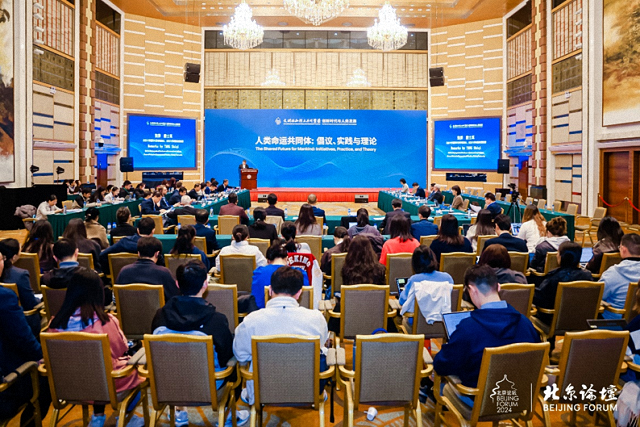
On November 2–3, 2024, the International Relations Sub-Forum of the Beijing Forum (2024) was successfully held at the Sunshine Hall of the Yingjie Exchange Center, Peking University. With the theme “The Shared Future for Mankind: Initiative, Practice, and Theory”, the sub-forum gathered renowned experts and scholars from Asia, Europe, the Americas, and Oceania. Together, they analyzed the world situation intertwined with turbulence and transformation, discussed the future development prospects of humanity, and explored the significance, challenges, and responses to building a community with a shared future in an age of uncertainty.
Distinguished international participants included Kim Yoo-seok, President of the Academy of Korean Studies; Jan Melissen, Editor-in-Chief of The Hague Journal of Diplomacy (Netherlands); Hyun Cho, former Vice Foreign Minister of the Republic of Korea; Randall Germain, Professor of Political Science at Carleton University (Canada); Qiao Ouyang, Professor at the University of Turin (Italy); Sebastian Biba, Professor of Political Science at Goethe University Frankfurt (Germany); Kai He, Professor at Griffith University (Australia); Zhang Yun, Associate Professor at Niigata University (Japan); David Bulman, Assistant Professor at Johns Hopkins University’s School of Advanced International Studies (USA); and Loh Ming Hui, Assistant Professor at Nanyang Technological University (Singapore).
Domestic participants included Sun Jisheng, Vice President of China Foreign Affairs University; Zhao Kejin, Vice President of the Global Industry Research Institute at Tsinghua University; Xie Tao, Dean of the School of International Relations at Beijing Foreign Studies University; Guo Shuyong, Dean of the School of International Relations and Public Affairs at Shanghai International Studies University; Wei Ling, Party Secretary of the School of International Relations at the University of International Business and Economics; Li Wei, Vice Dean of the School of International Studies at Renmin University of China; Zhu Jiejin, Professor at Fudan University; Zheng Hua, Professor at the School of International and Public Affairs, Shanghai Jiao Tong University; and Wang Dawei, Economic Affairs Officer at UNCTAD.
From Peking University, participants included Jiang Guohua, Vice Secretary of the CPC Committee, Director of the United Front Work Department, and Boya Distinguished Professor; Chu Xiaobo, Dean of the Division of Social Sciences and Professor of International Relations; Tang Shiqi, Dean of the School of International Studies and Boya Distinguished Professor; Wang Zhengyi, Chair of the Academic Committee of the School, Cheung Kong Scholar Distinguished Professor; Zhang Haibin, Vice Dean and Boya Distinguished Professor; Dong Zhaohua, Vice Dean; Zhang Qingmin, Chair of the Department of Diplomacy and Foreign Affairs Administration and Boya Distinguished Professor for Textbook Development; Wang Yong, Professor of International Relations and Director of the Center for American Studies; as well as Assistant Professors He Jiani, Xu Qinyi, and Chen Muyang. The opening ceremony was chaired by Zhang Haibin.
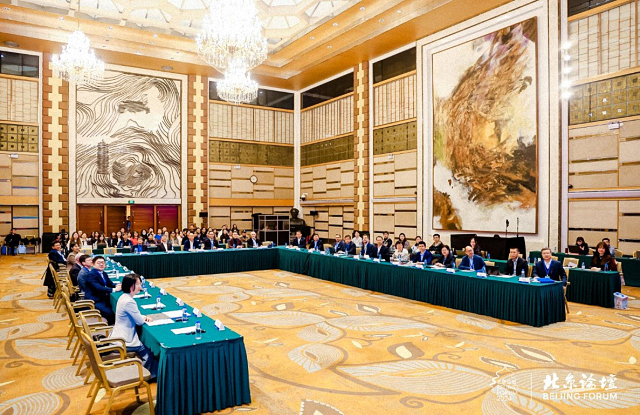
Conference venue
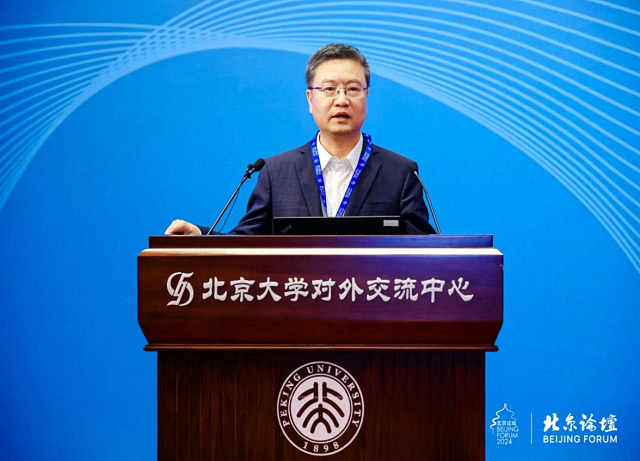
Zhang Haibin chairing the session
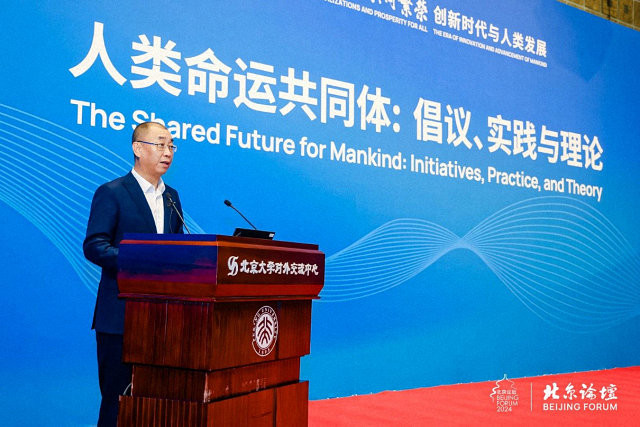
In his speech, Chu Xiaobo stressed Peking University’s strong commitment to international studies and research on the community with a shared future. He underscored the importance of balancing instrumental and value rationality in today’s complex political and economic landscape, and called for mutual respect for legitimate concerns while nations pursue their own interests. Reviewing the concept’s origins, he emphasized that it embodies strategies, ideas, visions, and goals, highlighting the importance of “self-discipline, self-awareness, and self-reflection.” He also expressed gratitude to the Beijing Forum for providing a valuable platform for dialogue and mutual learning.
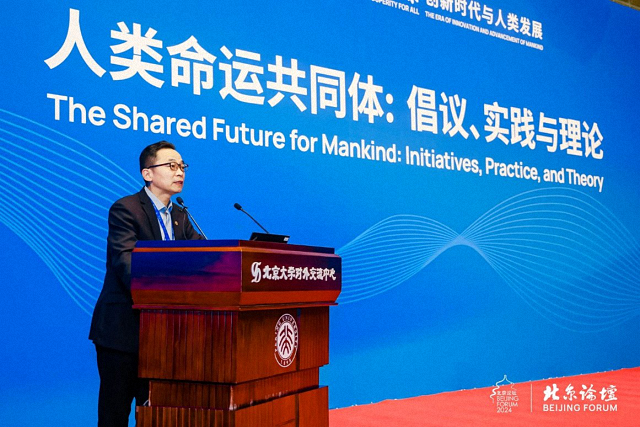
Chu Xiaobo delivering remarks
Tang Shiqi warmly welcomed the guests on behalf of the School. He pointed out that globalization has already bound nations and peoples into a community of shared destiny. Building such a community, he stressed, is China’s solution to global development challenges, rooted in traditional values of harmony and reciprocity. He noted the five dimensions of respect, tolerance, trust, diligence, and benevolence, and expressed hopes that the forum would inspire creative responses to global governance reform and challenges in China’s diplomacy and modernization. He also encouraged young faculty members to use this forum as an opportunity for growth.
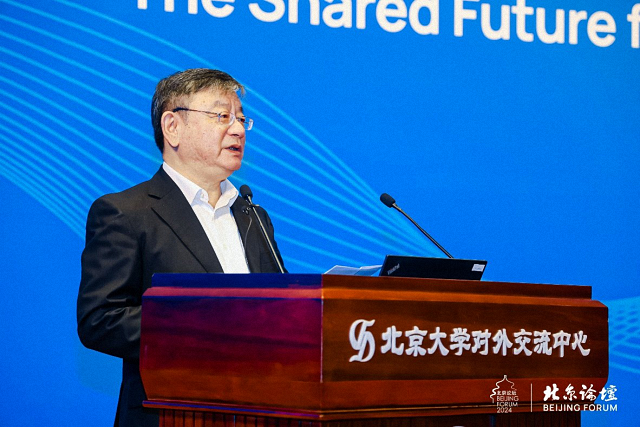
Photo: Tang Shiqi delivering remarks
In the closing remarks, Zhang Haibin praised the forum as a high-level, fruitful academic gathering. He noted that the in-depth discussions on Chinese diplomacy, the community of shared future, and global governance had produced valuable insights, strengthened scholarly friendship, and highlighted the importance of serious academic dialogue amid global uncertainty. He expressed heartfelt thanks to all participants, the Beijing Forum Secretariat, and the organizing team for their strong support and dedication.
The International Relations Sub-Forum of the Beijing Forum 2024 concluded successfully. Participants look forward to gathering again at Peking University in the golden autumn of next year.
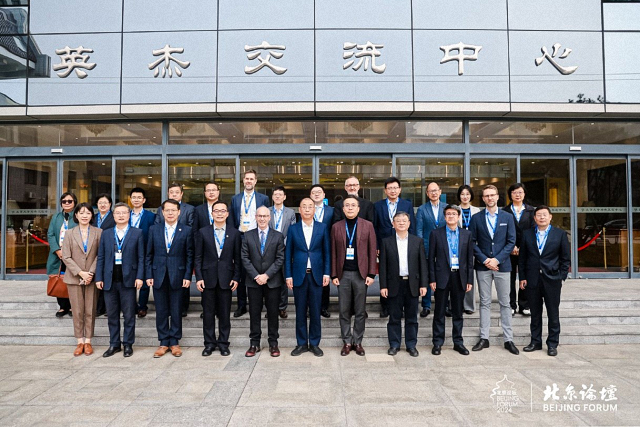
Photo: Group photo of participants
Written by: Gao Jingwen
Photo by: Beijing Forum Secretariat
Edited by: Wang Yumeng